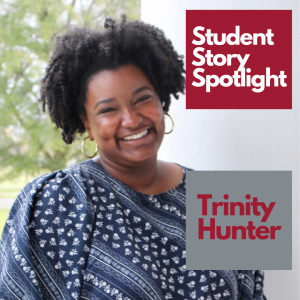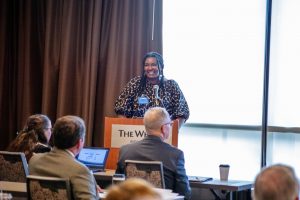Working for a Better Tomorrow
- December 12th, 2022
- in Student Stories

Montgomery, Alabama is known as the birthplace of the Civil Rights Movement. Today, the city’s legacy continues as it persistently cultivates citizens with a passion for social justice. Trinity Hunter, a current senior at The University of Alabama, is a part of that legacy. When she moved to Tuscaloosa for school, she carried with her a strong commitment to her principles of truth, justice and equality.
Trinity began her journey into higher education with high ambitions. From her very first semester, she’s been determined to leave a legacy at the Capstone that others can feel and see for years after her time. She’s been quite successful in this endeavor so far, as she’s involved in numerous student organizations and different departments under the Division of Student Life. Namely, she is the chairperson for the Blackburn Institute as well as the press secretary for the Student Government Association. Her responsibilities for both organizations align near-perfectly for her sense of values.
As a member of the Blackburn Institute, Trinity works as a “positive change maker for the state [of Alabama],” promoting civic and social action within local communities. She’s just as busy within SGA, as well, working to implement diversity, equity and inclusion (DEI) training across numerous student organizations while simultaneously performing her duties in the executive cabinet with fervor.
From this alone, it’s evident that Trinity has carved her own path at the Capstone and is actively invested in making positive changes within the student community. All great work must start somewhere, though. When asked what sparked her passion into public service, she had this to say:
“I’ve always really liked advocacy work. My family always called me their ‘little social justice warrior’ because even before I knew what that was, I had trouble understanding why things weren’t fair. Being the youngest sibling also contributed to that. Ever since I changed my major to public relations, I’ve been interested in doing advocacy work, non-profit work or advocacy-based PR.”

Trinity works hard to ensure that all students can have a positive experience at the Capstone. She said,
“Intersectionality comes in at different standpoints. The most visible, marginalized identities is where we can clearly see that we’re lacking. We hope that once more of those identities come in then they’ll bleed into the other identities and be able to work together peacefully and respectfully. I love talking about DEI. I was the first DEI officer for my sorority’s chapter here. It wasn’t always easy, but it taught me so much about myself.”
Of course, Trinity doesn’t do all of this work just for fun. Striving to integrate these values at UA is a personal matter that has roots in her childhood.
“It became very important to me that different voices were being heard. Especially having gone to a PWI (predominantly white institution) since I was four years old … I feel like you get accustomed to being in a space where your voice isn’t necessarily looked for. You have to just keep breaking in. You can’t be quiet.”
Thankfully for the UA community, Trinity’s ‘breaking in’ has made an impact. Now, as a senior, she can recall back to her freshman year and realize the progress the University has made during her time here. She enjoys looking at new underclassmen and realizing the newfound inclusivity they experience.
“We improve every single year. It’s hard to believe I used to be a freshman and that I was looking for my role models in all of these different spaces. It’s nice to be able to look at the younger classes and say, ‘Ok, we’ve done good here. More people feel that sense of inclusivity and belonging.’ That’s definitely been encouraging, and I hope that trend continues in the future.”